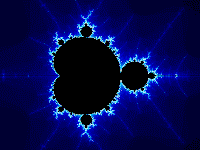Last night in our cul de sac, someone died at the house across from me. I do not know if it was their disabled (probably autistic) teenager yet or not, but I watched for hours hoping to see him pop out of the house, with family in tow, distraught and surrounded... three hours I sat there hoping. He never appeared. I wish I knew them better. All I could think about was "what happened, and was it him, was it the monster within, the one we pretend isn't there, the one driven by repetition, iterations, and chaos, the one that chains minds to the purpose only, never connecting, never forgiving...did it destroy him and his family?"
Chaos theory is the study of nonlinear dynamics, in which seemingly random events are actually predictable from simple deterministic equations.So... you might want to skip the next paragraph that is probably a bit "TLDR" but it has a brief overview of fractals, and how I came to understand them and why they relate to Autism:
From tiny Mandelbrot sets, did giant complex iterations grow:
 |
| The evolution of fractal software has been fascinating and intimidating to witness through the decades. |
In the early 90's, I had a software program called "Iterations." To use it, you applied equations to a simple "mandelbrot set" (see top image) to create fractal images. Periodically you would make something astonishing, after applying random series of equations, and find yourself saving enormous graphic files on tiny hard drives, waiting impatiently for the day your computer was big enough to hold your imaginary iterated fairy world. They could not be printed, because to print them would make them static. The images themselves behaved like living beings...you could continue zooming in to whole new, but eerily identical structures, searching within spiral arms for wonder and beauty. Then you could briefly freeze it, take a snapshot of your screen and keep it, but having trapped it in a static form, you felt a little empty looking at it later...
Today I mentioned to a friend that my son was an iteration of his father...
Truer things have never been said.
Autism in this family is quite unmysterious because it is pervasive. My experience is vast, but when I look at my son I try to zoom in on the spiral, hoping to find wonder hiding among the replications of behavior, mannerism, posture, misapplied reality-testing, psychotic rambling, aggression, sorrow, and isolation.
I take snapshots, hoping that if I expand that portion of the equation, I will find something new, something beautiful. In the end the snapshots are empty. The pattern continues to replicate.
Admiring the beauty that you can find only if you define the repetitive form as beautiful because it is intricate is not the same thing as finding beauty. The first thing relies on your choice to perceive it as such. The second is a more Platonic formal idea of beauty, where beauty is reflective of perfection. I can love my son because I choose to see these snapshots as intricate and valuable, but I can also hate that he is, in essence, a series of iterations, repetitions, and mathematically precise and tragically predictable chaotic forms.
My son, as "seen from a helicopter", is a person who reacts to events around him the same way every time, expects and needs events to unfold in ways that fit the equation he has defined, and never quite shakes the pattern. Just like his father before him...
I seek comfort and connection in both my neuro-typical child and people outside our family because it is very lonely on the edge of the iterative autistic world of my son and husband.
In essence, my emotional hard drive is completely full of snapshots now, in a vain attempt to comfort myself within the repetition. I endlessly chase the idea that their iterations are somehow meaningful, and not just numbers in the void. I hurt and ache for companionship, something that breaks them out of the pattern so they can really see me or anyone else for that matter. I fail spectacularly and (ironically) repeatedly to really impact the monster, and hopelessness sets in.
I can fight off feeling hopeless that my son and husband are locked in mortal combat with their iterative thoughts, but I have to do it by re-interpreting the pattern and imposing my own need for spontaneous, genuine connection on it, with or without their cooperation and consent. I also get away from their thinking regimens regularly and interact with the NT world without an autistic person to care for standing right beside me. I believe our ability to help as caregivers depends entirely on our ability to stay sane and NT and shed the iterative thought process and NOT do it ourselves because it is how we have to communicate with them. That staves off the hopelessness to a degree, but it usually returns.
Iterations are a prison. If your goal is to break your loved one free, and you know in your heart it is impossible, but you keep trying anyway... how can you tell if they ever really know why you tried and why you were the source of their frustration, why you wouldn't let them just replicate thoughts, behaviors, actions, why you insisted that the different was the pathway...
May God have mercy on my neighbors.
Requiem aeternam, dona eis Domine, et lux perpetua luceat ei. Requiescat in pace. Amen.
The bell tolls for thee never had more meaning for me than at 1 AM this morning.
 |
| May the Angels lead you into paradise... |

No comments:
Post a Comment